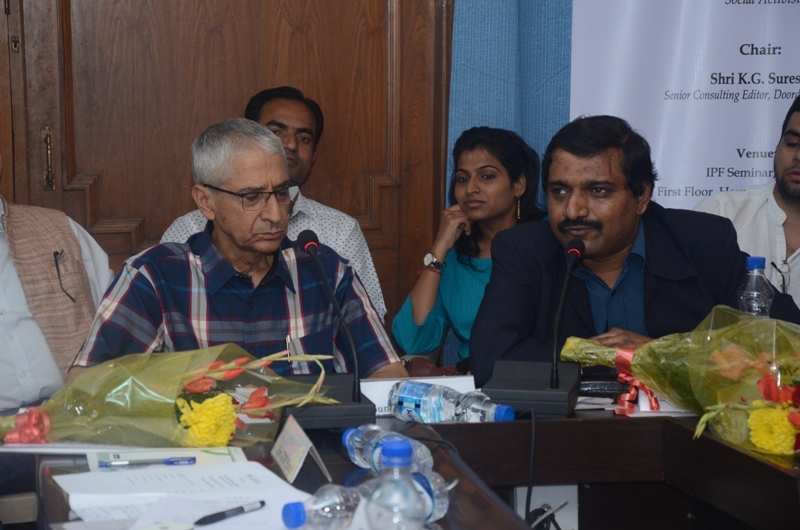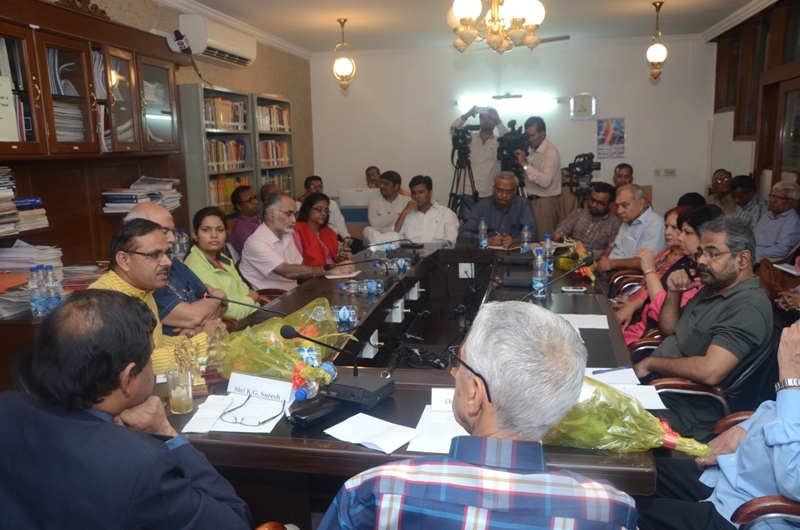New Constitution of Nepal: Complexities and Inaccuracies
Total Views |
November 4, 2015, IPF Seminar Hall, New Delhi
Speakers: Dr. Sundar Mani Dixit, Chairman, People’s Society for Peace and Development, Nepal
Shri Ravit Kumar, Social Activist
Chair: Shri K G Suresh, Senior Consulting Editor, Doordarshan News.

India Policy Foundation (IPF) on November 4, 2015 organized a seminar on ongoing problem in Nepal against the promulgation of constitution of Nepal ‘New Constitution of Nepal: Complexities and Inaccuracies’ in which sections like Madhes and Gharu have been denied some basic rights. Speakers solely held Nepali politicians responsible for it and advocated the Indian government to handle the issue with more care.
Speaking on the occasion Dr Sunder Mani Dixit said, “If you are pro-India in Nepal you are anti-national. Actually issues related to Madhesh needed to be addressed before constitution was promulgated but it was done in hurry. This has snatched right from a few sections of Nepalese.”
Dr Dixit said that people must understand that the problem of Nepal was to be sorted out by Nepal as it was Nepal that was going to be at the receiving end if problem persists. “I spoke to the chairman of the Nepalese Constituent Assembly Subhash Nimbham to give cooling off time before constitution is promulgated and in the meantime all vexed issues with different communities are addressed but he did not pay any heed to it and continued with it. He rushed to plans to promulgate it despite the fact that draft was not acceptable to any group,” said Dr Dixit.

So it must be understood that the problem was not created by the people rather by politicians of Nepal. Moreover, opinion expressed was that ultimately it is Nepal which is going to suffer from it. Dr Dixit said, “If people or politicians think that three check post of China will take care of needs of Nepal, they making fool of themselves. India is the only country that can address problems, however, some sensitization to Indian people especially diplomats is required to handle things in a better way.”
Though Nepal does not have any India policy and more or less India is on the same page. However, Shri Gopal Agrawal said, “The Indian government is of clear opinion that the constitution is divisive and issues of Madeshies must be addressed into it.”
Chair on the occasion and senior journalist Shri K G Suresh said that Nepal was very much sensitive about its sovereignty and looks at India for its big brother attitude. This is inherent in any such country which is in such state of affairs. But it got deteriorated due to interference and involvement of China, ISI and anti-India elements who are trying to create a bad blood about the two-nation. They had been trying to make people understand that a Sikkim kind of situation could be repeated with Nepal. He said that rights of Madhesh must be protected and power should be decentralized.
Speaking on the occasion Shri Ravit Kumar said that there were four meeting grounds that make idea about India. 1) Indian Embassy 2) 70 lakh Nepalese working in India 3) Businessmen 4) security force posted at border. There are contradictions in policies of India-Nepal. India still looks at Nepal with the point of view of Britain and Nepal still looks at people with a view of monarchy despite being a democracy.
Shri Kumar said that people of Nepal need love and affection than anything else. Some International groups are also contributing for the deteriorating relations between India and Nepal that include China, US European Union and Bangladesh. There are certain issues that India must need to learn from Nepalese constitution. However, despite opposition about secularism world it managed to find place in Nepalese constitution but it is explained.
India-Nepal relations are not between the two governments rather they are much more than that. There is a need to deal it sensibly else Nepal will be at loss. Delimitation, distribution of seats and citizenship issue are the vexed issue to be taken care off.
Senior Fellow Vivekananda International Foundation RNP Singh said that division of Nepal into seven parts was done improperly and demand of Madhes to be given a separate province was justified as they constitute 52 per cent of Nepalese population. Citizenship issue is a big issue and offspring of Indo-Nepali parents will not be given constitutional position in the new constitution that is alarming and it must be addressed.